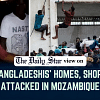Turmoil in Mozambique: Bangladeshis’ homes, shops being attacked
Law enforcers only watch as some Mozambicans loot shops and set fire to homes belonging to Bangladeshis. Sometimes, the groups extort money from Bangladeshis by threatening to attack them, their homes or businesses.
This is what over a dozen Bangladeshis said over a conference call between this paper and them on December 25. They joined from different provinces of the country.
Ziaul Islam, a Bangladeshi living in Zigi of Zambezia, told The Daily Star, "We have to pay around 20,000 metical [over Tk 37,300] to ensure our security. We have to pay them [natives] whenever they discover our hideouts."
Ziaul claimed that almost every Bangladeshi involved in business has been attacked, and they are now moving from one hideout to another after leaving their homes behind.
Mozambique, an eastern African nation, has been engrossed by violence and anarchy following its presidential election and the contentious results.
The unrest spread after Mozambique's top court on December 23 declared Frelimo party presidential candidate Daniel Chapo the winner of October's elections, prompting opposition supporters to make good on their promises to continue protests.
Amid the turmoil, 5,000 to 8,000 Bangladeshis in Mozambique are living in fear, insecurity, and uncertainty.
Ziaul is among the worst affected. The man from Cox's Bazar went to Mozambique in 2019 on a tourist visa and started working in the shop belonging to his elder brother.
He then converted his visa to business visa and opened a grocery store.
"My warehouse was looted. They also damaged the tin roof by throwing stones," Ziaul said, adding, "I watched the whole thing on CCTV as they looted my shop, but I was powerless.
"Since the October election, we spent at least Tk 5 lakh to bribe the local administration for ensuring security of ourselves and our businesses. But now we are not getting any support despite repeated appeals," Ziaul said.
He said, "We have bought land and a house in the country, but now we want to return to Bangladesh. We do not know how long we will be able to survive here …."
During the conference call with those living in Mozambique, Md Ayub, a Bangladeshi living with his family in the Matola suburb of Maputo city in the southern tip of Mozambique, said he has to go (disconnect the call) as some people attacked his home.
This paper later learnt that Ayub's home had been attacked and that he sought help from the Bangladeshi community there.
Another Bangladeshi, Enamul Haq, from Maputo said he has been living in Mozambique with family since 2007. "I have four superstores in four provinces and all them have been looted. Now I am hiding in the homes of the natives paying them handsome amounts for safety."
Anisur Rahman, a Bangladeshi community leader there, told this newspaper that there are around 8,000 Bangladeshis, including about 500 women and 800 children, in Mozambique.
He said Bangladeshis do not directly migrate to the country. Most convert their tourist visas to investors' visas and set up grocery stores in rural areas. These shops are mostly being looted by people who come out of forests.
He said, "We are caught in the conflict between the ruling and the opposition parties. We are in different hideouts now.
"Since there is no Bangladeshi embassy, we want a solution through the intervention of the interim government. We are helpless here. In one province alone, more than 90 percent shops were looted."
Asked about seeking help from local police or the army, Anisur said, "The army is observing as silent spectators. We do not get any help from the police."
He said many Bangladeshis have lost their passports and other necessary documents in the chaos and some do not have the money to fly home.
"We are communicating with the Bangladesh embassy in Lisbon and seeking help. Please help us, save the lives of these people," Anisur said.
Thousands of miles away, Laila Muntajeri Deena, chargé d' affaires of the Bangladesh embassy in Portugal, responsible for Mozambique, told The Daily Star, "We are continuously communicating with the Bangladeshi community leaders in Mozambique, and sending reports about the conditions to the foreign ministry in Dhaka.
"We have advised the Bangladeshis not to panic and to stay safe as the situation is not good.
"We have asked the community leaders to make an area-wise list, including the locations and number of women and children, so that we can provide support in case of any emergency."
Asked about sending aid to those in danger now, Deena said, "It may not be possible to go there right now. But we will update our ministry about the situation from time to time."
"… Our South Africa mission is also collecting information as they are close [to Mozambique] in terms of distance."
On December 25, Al-Jazeera quoting local authorities reported that a suspected riot inside a jail in Mozambique's capital has left at least 33 people dead and 15 injured, and more than 1,500 inmates escaped.
According to a DW report on Sunday, thousands of families are crossing the border into Malawi as political violence in Mozambique continues. The DW quoted an official saying that situation is "dire".
Dominic Mwandira, commissioner for Malawi's southern border district of Nsanje, said around 2,500 families had reached there.
"About 11,000 people crossed the Shire river to enter Malawi, while an additional 2,000 crossed the Ruo river," the AFP quoted him as saying.

 For all latest news, follow The Daily Star's Google News channel.
For all latest news, follow The Daily Star's Google News channel. 





Comments